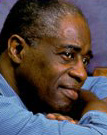|
Jazz Profiles from NPR
Norman Simmons
Produced by Joan Merrill

|
|
Pianist Norman Simmons is a consummate musician, best known for his ability to connect with jazz singers like Carmen McRae, Anita O'Day, and Joe Williams. Much more than just an accompanist, Simmons is an extremely accomplished soloist, arranger, composer and educator.
|
 |
Listen to pianist Ralph Sharon and saxophonists Scott Hamilton and Houston Person
|
Born in Chicago in 1929, Simmons' childhood was filled with the sound of the big band era in full bloom. In particular, he was captivated by Duke Ellington Orchestra broadcasts coming over a neighbor's radio.
He started teaching himself at the family piano, but recalls that his playing and foot-stomping to keep time weren't very well received by the downstairs neighbors. Undeterred, Simmons progressed quickly. At age 16, he enrolled in the Chicago School of Music, where he completed his studies in four years.
 |
Listen to Simmons recall his early fascination with jazz
|
A motivated young musician, Simmons formed his own group in 1949 and began recording in 1952. His composition "Jan" was a hit for tenor saxophonist Paul Bascomb in 1953. Simmons kept a steady gig leading the house trio at Chicago's hottest jazz club, The Beehive, where his group would back touring greats like saxophonists Wardell Gray, Lester Young and Charlie Parker. Later, after leading a nonet at the C & C Lounge, Simmons began accompanying jazz singers in 1958 and quickly earned a reputation as an exceptional accompanist.
 |
Listen to Simmons explain why he began accompanying singers
|
Simmons was highly sought after by touring vocalists, and one, Ernestine Anderson, convinced him to move to New York to continue working with her. Simmons also began playing with tenor saxophonists Johnny Griffin and Eddie "Lockjaw" Davis. He wrote intricate arrangements for Griffin's band, resulting in soulful, swinging recordings, including the classic album The Big Soul Band.
 |
|
In 1960, Davis recommended Simmons to vocalist Carmen McRae (left), who had a reputation for being extremely demanding of accompanists. But the skilled and versatile pianist exceeded McRae's high expectations and they spent the next nine years performing and recording together.
|
 |
Listen to Simmons define "pulsation" -- his term for the complicated tempo changes McRae employed when singing slow ballads
|
In 1969, Simmons decided to pursue new musical avenues with other vocalists. With Betty Carter and Anita O'Day, he found greater freedom to improvise and his soloing prowess crystallized. In 1979, he began his long-standing collaboration with singer Joe Williams.
 |
|
Williams (left) and Simmons shared a simpatico that's in the league of Ornette Coleman and Don Cherry, Ella Fitzgerald and Tommy Flanagan, and Duke Ellington and Billy Strayhorn. It can be heard throughout their music, especially on on songs like "You Can Depend on Me."
|
 |
Listen to Simmons and Joe Williams talk about their musical bond
|
Simmons' ability to challenge himself and other musicians carries over into his work as an educator. He has taught at Paterson State College in New Jersey since 1982 and also participated in the Jazzmobile program for 20 years, fostering music education at New York's public schools. Simmons' dedication to his students is equal to his commitment to jazz itself.
Simmons insists he enjoys helping others excel, "I always get a lot of satisfaction knowing that I pushed someone up to the skies." No doubt, his contributions provide even greater satisfaction to jazz musicians, students and audiences everywhere.
|